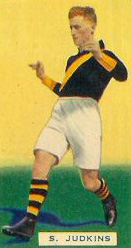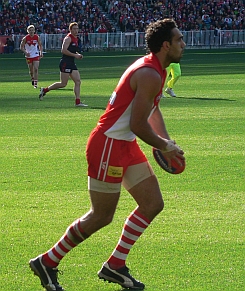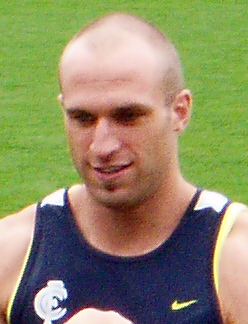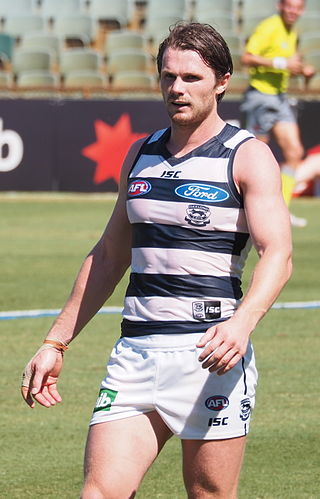Related Research Articles

The Charles Brownlow Trophy, better known as the Brownlow Medal, is awarded to the fairest and best player in the Australian Football League (AFL) during the home-and-away season, as determined by votes cast by the three officiating field umpires after each game. It is the most prestigious award for individual players in the AFL. It is also widely acknowledged as the highest individual honour in the sport of Australian rules football.
Gregory Donald Williams is a former Australian rules footballer who represented Geelong, the Sydney Swans and Carlton in the Australian Football League (AFL) during the 1980s and 1990s. A midfielder, he is a dual Brownlow Medal winner and at his peak was the then-highest-paid player in the history of the sport. He was also linked to some controversy during the 1990s.
Harry Collier was an Australian rules footballer in the Victorian Football League.
The J. J. Liston Trophy is awarded annually to the best and fairest senior player in the Victorian Football League. It is named after J.J. Liston, a businessman, civic leader and sports administrator who was fundamental in advancing sport in Australia, particularly Australian Rules Football and Soccer.

Stan Judkins was an Australian rules footballer who played for the Richmond Football Club in the Victorian Football League between 1928 and 1936. He became the first Richmond player to win the game's most prestigious award, the Brownlow Medal.

The 1930 VFL season was the 34th season of the Victorian Football League (VFL), the highest level senior Australian rules football competition in Victoria. The season featured twelve clubs, ran from 3 May until 11 October, and comprised an 18-game home-and-away season followed by a finals series featuring the top four clubs.

The 2006 Brownlow Medal was the 79th year the award was presented to the player adjudged the fairest and best player during the Australian Football League (AFL) home and away season. Adam Goodes of the Sydney Swans won the medal by polling twenty-six votes during the 2006 AFL season. It was Goodes' second Brownlow Medal win, after his victory in 2003.

The 2007 Brownlow Medal was the 80th year the award was presented to the player adjudged the fairest and best player during the Australian Football League (AFL) home and away season. Jimmy Bartel of the Geelong Football Club won the medal by polling twenty-nine votes during the 2007 AFL season.
The 1924 Brownlow Medal was the inaugural year the award was presented to the player adjudged the fairest and best player during the Victorian Football League (VFL) home and away season. Edward 'Carji' Greeves of the Geelong Football Club won the medal by polling seven votes during the 1924 VFL season.

The 2010 Brownlow Medal was the 83rd year the award was presented to the player adjudged the fairest and best player during the Australian Football League (AFL) home and away season. Chris Judd of the Carlton Football Club won the medal by polling thirty votes during the 2010 AFL season. It was broadcast on Channel Ten and, for the first time, simultaneously on One live and nationally.

The 2005 Brownlow Medal was the 78th year the award was presented to the player adjudged the fairest and best player during the Australian Football League (AFL) home and away season. Ben Cousins of the West Coast Eagles won the medal by polling twenty votes during the 2005 AFL season. It was Cousins' first Brownlow Medal win, and with Daniel Kerr finishing the runner up, it was the first time in 79 years that the top two votegetters were from the same club.
The 2004 Brownlow Medal was the 77th year the award was presented to the player adjudged the fairest and best player during the Australian Football League (AFL) home-and-away season. Chris Judd of the West Coast Eagles won the medal by polling thirty votes during the 2004 AFL season.
The 2003 Brownlow Medal was the 76th year the award was presented to the player adjudged the fairest and best player during the Australian Football League (AFL) home-and-away season. Nathan Buckley of the Collingwood Football Club, Adam Goodes of the Sydney Swans, and Mark Ricciuto of the Adelaide Football Club all won the medal by polling twenty-two votes each during the 2003 AFL season.
The 1977 Brownlow Medal was the 50th year the award was presented to the player adjudged the fairest and best player during the Victorian Football League (VFL) home and away season. Graham Teasdale of the South Melbourne Football Club won the medal by polling fifty-nine votes during the 1977 VFL season. The count was the second of two occasions in which the two field umpires independently voted for the best players on the ground under the 3-2-1 system. This meant that the winner of the Brownlow had a higher number of votes than usual, and Teasdale's fifty-nine votes set and holds the record for the most votes ever polled in a single season. From 1978 onwards, the field umpires conferred after each game and awarded a single set of votes, rather than voting independently.

The 2016 Brownlow Medal was the 89th year the award was presented to the player adjudged the fairest and best player during the Australian Football League (AFL) home and away season. Patrick Dangerfield of the Geelong Football Club won the medal by polling thirty-five votes during the 2016 AFL season, at the time the most by any player under the 3-2-1 voting system, beating the previous record of 34 votes set by Dane Swan in 2011.
The 1931 Brownlow Medal was the eighth year the award was presented to the player adjudged the fairest and best player during the Victorian Football League (VFL) home and away season. Haydn Bunton of the Fitzroy Football Club won the medal by polling twenty-six votes during the 1931 VFL season.
The AFL Women's best and fairest is awarded to the best and fairest player in the AFL Women's (AFLW) during the home-and-away season, as determined by votes cast by the officiating field umpires after each game. It is the most prestigious award for individual players in the AFLW. It is also widely acknowledged as the highest individual honour in women's Australian rules football.

The Lambert–Pearce Medal is awarded to the best and fairest player in the VFL Women's (VFLW) during the home-and-away season, as determined by votes cast by the officiating field umpires after each game. It is the most prestigious award for individual players in the VFLW.
The Dhara Kerr Medal is awarded to the best and fairest player in the WAFL Women's (WAFLW) during the home-and-away season, as determined by votes cast by the officiating field umpires after each game. The award was part of the original West Australian Women's Football League competition and was carried over to the WAFLW when it commenced in 2019. Kerr was born in Warrnambool, Victoria in 1971 and died in Perth in 1995, three years after she had relocated to Western Australia and begun playing football for Innaloo.
References
- ↑ Lovett, Michael, ed. (2009). AFL Record Season Guide 2009. Docklands, Victoria: Slattery Media Group. p. 496. ISBN 978-0-9805162-6-5.
- ↑ "1976 Brownlow Medal". AFL Tables. Retrieved 7 November 2016.